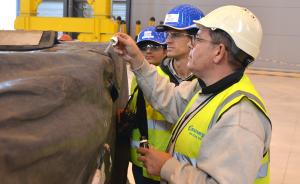Cargo, barge, monster trailer ... and an eyedropper
Shipping three 120-tonne cryostat segments from India to the ITER site, some 9,000 kilometres distant, is a huge global operation involving a large cargo ship, a specially designed barge, tugs, three monster trailers, dozens of accompanying vehicles and—once the convoy reaches the ITER Itinerary—more than one hundred specialists.
"In the presence of salt, silver nitrate reacts by forming white foam," explains Alain Spatafora, the transport expert commissioned by the ITER Organization and logistics provider DAHER. "And this is precisely what we need to know: are the small water puddles that have accumulated on the tarpaulin's surface saline or not?"
This can make an important difference. In the course of six-and-a-half weeks of travel the loads have seen their share of rough seas and heavy rains and—despite the best protection—some water has inevitably seeped into the folds and creases of the plastic tarpaulin.
"Rainwater is okay. But if we find that these puddles have a degree of salinity, we would need to wash away the salt in order to avoid corrosion."
On Thursday afternoon, Alain Spatafora did an average of 15 tests on each of the three wrapped segments and white foam failed to materialize. Using the same simple technique, further tests will be performed on the unwrapped components in the coming days.
In parallel, helium leak tests have begun on the first welds performed for tier 1 of the cryostat base; these will be complemented with X-ray radiography in the coming days.



